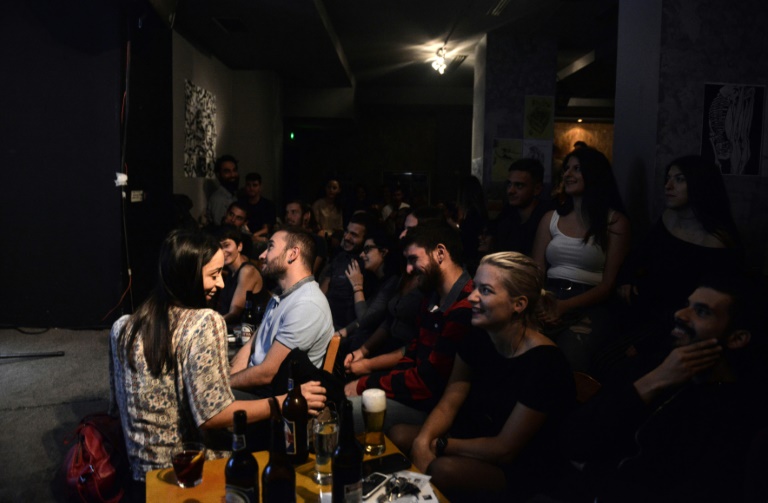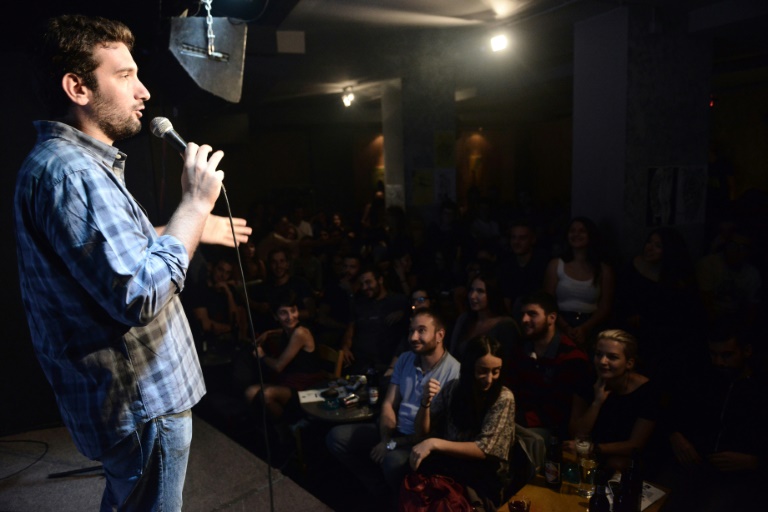The crammed basement bar heaves with laughter as the young comedians take to the microphone, riffing on daily life in austerity-slammed Greece.

This is one of a growing number of open mic nights to have sprung up in the past few years as audiences find stand-up comedy in the middle of economic tragedy.
Ancient Greek dramatist Aristophanes — known as the Father of Comedy — was writing plays that lampooned the worlds of politics, art and philosophy as far back as 425 BC. But stand-up here is a new art form.
“Ten years ago Greeks didn’t know what stand-up was,” says professional comic Andreas Paspatis, 28, the compere of the monthly Open Mic Thessaloniki, in Greece’s second-largest city.
“When I was booking gigs back then we would call the bar and when we said we’re doing stand-up, 90 percent of them would ask, ‘What’s that?'”
In Britain, successful stand-up comedians have a certain status, appearing on television panel shows and often commentating on current affairs and writing newspaper columns.
But, while Greek television features sketch and comedy shows, it has no stand-ups, and there are still only about 20 professionals in the country.
Many people get their first taste watching foreign stand-ups on the internet, says Ira Katsouda, one of Greece’s few female stand-ups, whose own influences include cross-dressing Briton Eddie Izzard and philosophical American Louis CK.
But the Greek crisis has also helped put stand-up in the spotlight and not just because of cheap production costs, says the 33-year-old, ahead of a sell-out show.
“Stand-up comedy is blossoming here. I do believe the crisis has played a big role in this.
“It’s a cheap form of entertainment and in these dark times — what I’m going to say is a cliche, but I’m going to say it — people need to laugh,” she said.
– Enough of politics –
In her routine for “Gluten-free”, touring in theatres in Thessaloniki and Athens, Katsouda however steers clear of politics and says most other stand-up comedians do the same.

The Greek crisis has helped put stand-up in the spotlight, says Ira Katsouda, one of the country’s few female stand-ups
“The audience is sick and tired of talking about politics,” she says.
At the open mic night the air is thick with sweat, smoke and laughter as the 12 stand-ups try out new material on a young audience, who have paid three euros ($3.5) entrance fee and, in many cases, make their drinks last the length of the show.
With ages ranging from 17 to 37 and just one woman among them, the stand-ups include a schoolboy, four university students, a lawyer, a male nurse, a teacher, an unemployed man and three professionals.
When the compere Paspatis asks first-timers in the audience to clap, there is loud applause. It’s an enthusiastic and friendly crowd — heckling is still a foreign concept here.
“I’m really pumped up,” says 17-year-old schoolboy Dimitris Marintsios, nervously running through his lines before performing for the first time.
“I think it’s a great idea, a guy on the stage telling jokes, I think it’s super cool.”
– ‘Coping mechanism’ –
Young people may be struggling with close to 45-percent unemployment “but I’m not going to talk about the crisis because it’s not that funny”, he says.
When he hits the stage however, he does have a skit involving fare dodging on the city bus.
“When the inspector comes on we’re all stressed, I don’t mean only the ones without a ticket but also the ones with a ticket,” he tells the audience, to building laughter.
“I always have a ticket but I’m always stressed about the moment he’s going to come up to me… as if he’s going to say, ‘That isn’t a very good ticket!'”

Professional comic Andreas Paspatis says that 10 years ago Greeks didn’t know what stand-up was
The Greek economy nearly collapsed in 2010 under a mountain of debt and it had to be bailed out by its eurozone partners three times to prevent it bringing down the single currency bloc.
Athanasios “Cain” Samaras says that for people of his generation, talking about everyday life inevitably involves talking about the crisis, or at least its effects.
He struggles to make a living as a professional comedian, and like many young Greeks survives only by living rent-free with his parents, which he talks about in his set, along with struggling to get by on a low budget, and the rage of biting into a croissant to discover there is no chocolate filling.
“I grew up with the crisis. The moment I started to need money, it was there. So yes, it’s an influence, it’s life,” he says.
“It’s very difficult (to be a stand-up) but I don’t want to give up, I’m only 25 and I’m a romantic.”
But outside the venue, smoking a cigarette on the step, 21-year-old waitress and stand-up fan Mary Tsevrentzidou says she does not indulge romantic thoughts of a brighter future.
“People my age are a little bit more nihilistic. We can’t have any romantic thoughts, we can’t live in the clouds, so this is a coping mechanism for us.”
Support Local Journalism
Add The Citizen as a Preferred Source on Google and follow us on Google News to see more of our trusted reporting in Google News and Top Stories.






